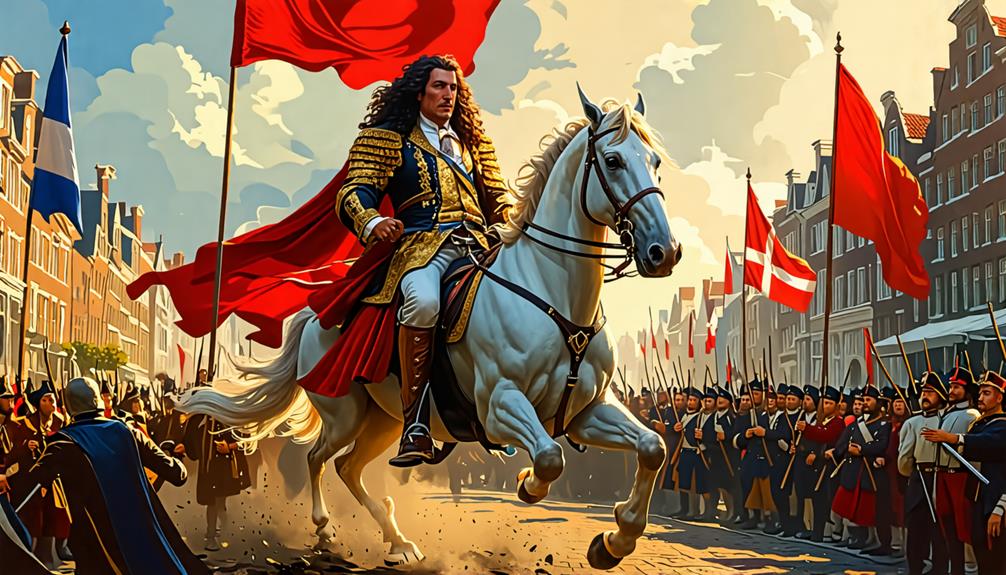What if the powerful French king Louis XIV had emerged victorious in his attempts to conquer the Dutch Republic in the 17th century?
This alternate historical scenario would have dramatically altered the balance of power in Europe.
Let's explore how a French triumph over the Dutch would have changed the course of history. From politics and economics to religion and colonial rivalries, the consequences of this alternate timeline are far-reaching and fascinating to consider.
Political Repercussions

Had Louis XIV succeeded in conquering the Dutch Republic in the 17th century, it's possible that France would have become the dominant power in Europe. One theory is that this would have led to a more centralized and authoritarian political structure across the continent, with other nations struggling to compete with France's military and economic might.
It's also conceivable that the Dutch Republic's innovative financial systems and trade networks would have been absorbed into the French empire, potentially accelerating the development of modern capitalism. However, some historians argue that the loss of Dutch independence could have stifled the creativity and entrepreneurship that made the Dutch Republic such a dynamic force in the first place.
Interestingly, a similar scenario did occur in the late 18th century, when Revolutionary France briefly conquered the Dutch Republic and established the Batavian Republic as a puppet state. While this experiment was short-lived, it demonstrates how the ideas of the French Revolution could have spread more rapidly and extensively if France had achieved a more decisive victory over its rivals in the 17th century.
Economic Consequences
If Louis XIV had conquered the Dutch Republic, it would have dramatically altered Europe's economic landscape. One theory is that French control over key Dutch ports like Amsterdam and Rotterdam could have disrupted trade networks and given France a dominant position in global commerce. This might've led to France amassing even greater wealth and power, forcing other European nations to adapt to the new economic reality.
Interestingly, while Louis XIV never achieved this conquest, Napoleon Bonaparte did briefly overrun the Dutch Republic in the early 1800s during the Napoleonic Wars. However, his rule was short-lived, and the Netherlands soon regained independence, limiting the long-term economic impact.
It's fascinating to consider how different European history and economic development might've been if either French ruler had been able to permanently subordinate the Dutch Republic.
Religious Implications

Had Louis XIV conquered the Dutch Republic in the 17th century, it would have likely led to significant changes in Europe's religious landscape. One theory is that the Catholic French may have imposed their faith on the predominantly Protestant Dutch, potentially resulting in religious persecution, forced conversions, and the suppression of Dutch Calvinism.
While this scenario didn't occur under Louis XIV, Napoleon Bonaparte later annexed the Dutch Republic in 1810, though he didn't impose religious changes.
It's possible that a French conquest in the 17th century could have tipped the balance of power in favor of Catholicism in Europe, but the extent and long-term effects of such a shift remain a matter of historical speculation.
Colonial Rivalries
If France had conquered the Dutch Republic in the 17th century, it likely would have intensified colonial rivalries and impacted the lucrative trade in the East and West Indies. France would have gained key Dutch ports and trading posts, allowing them to compete more fiercely with England for overseas dominance.
One theory is that global power dynamics could have shifted considerably, with France potentially becoming the preeminent colonial empire of that era. It's possible that England or another European power like Spain could have conquered the Dutch Republic at a later date, leading to similar colonial implications.
Cultural Shifts

If France had absorbed the Dutch Golden Age's artistic innovations and intellectual advances, it may have led to a unique blend of Dutch and French styles. One theory is that Rembrandt's techniques could have combined with French Baroque, resulting in a new artistic movement. Vermeer's genre scenes might've sparked the Académie to explore fresh subject matter.
The ideas of Dutch philosophers like Spinoza and Descartes may have been debated in Parisian salons, potentially influencing French Enlightenment thinkers. Additionally, Dutch maritime expertise could have propelled France's naval aspirations, possibly altering the balance of power in Europe.
Interestingly, Napoleon later tried to incorporate the Netherlands into his empire in the early 1800s. While short-lived, this did lead to some diffusion of Dutch culture into France.
European Power Balance
If Louis XIV had conquered the Dutch Republic in the 17th century, it would have dramatically altered the balance of power in Europe. One theory is that France would have become a hegemonic power, dominating continental affairs for decades to come.
England might've been forced into an uneasy alliance with other nations to counter French power, while the Holy Roman Empire could have been weakened and divided. Additionally, Spain's decline might've accelerated, leaving its European territories vulnerable to French aggression.
Interestingly, a similar scenario did occur in the early 19th century when Napoleon Bonaparte's France conquered much of Europe, leading to a period of French dominance until his ultimate defeat.
Conclusion
You might argue that the Dutch spirit of independence would have eventually prevailed, but consider this: France's centralized power and the immense resources of the Dutch trading networks would've created an empire like no other.
Louis XIV's conquest of the Dutch Republic wouldn't just have reshaped Europe – it would've altered the course of global history, from the halls of power to distant colonies, transforming economies, faiths, and cultures in its wake.

Leave a Reply